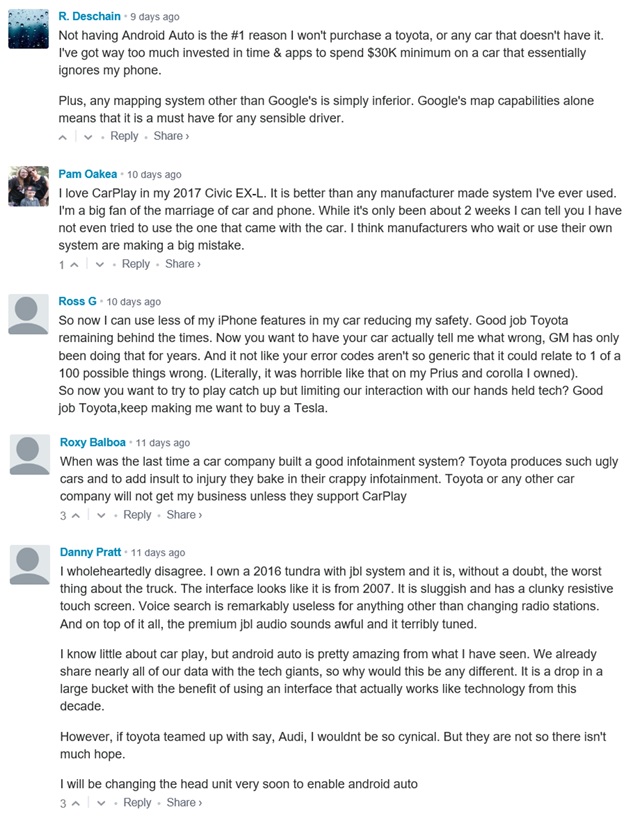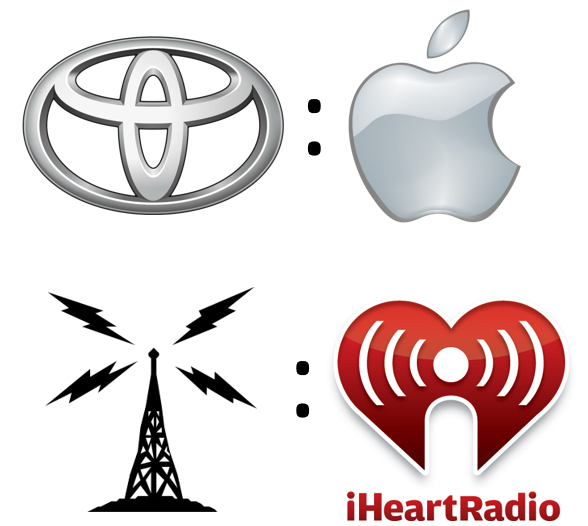
If you’re in the automotive industry, you have to hand it to Toyota. They’re either the smartest car company on the planet or the dumbest.
That’s because they’re the only major automaker taking a pass on both the Apple CarPlay and Android Auto dashboard ecosystems. As the largest car company in the world, their decision is worthy of our attention.
In a commentary in PC Mag auto writer Doug Newcomb gives props to Toyota for having the stones to snub both tech companies in favor of their proprietary in-dash system. As an alternative, Newcomb reports Toyota recently announced a connectivity plan being developed by their own in-house group, the cleverly named Connected Car Company.
Toyota has also struck deals with other tech providers (but not Apple or Google), as well as adopting Ford’s SmartDeviceLink for third-party app development. (That’s the platform our app company, jacapps, develops for in both Ford and now Toyota vehicles.)
So, is Toyota smart to go their own way or will they be left out in the cold by their decision to eschew Apple and Google in-dash technology? Newcomb suggests they could emerge as the winner by adopting a “wait-and-see” approach.
But a deeper look into the comments that follow his commentary points to showroom turbulence for Toyota. Here’s a sampling from some consumers who are pushing back against the Toyota decision. These comments are pretty indicative of what most had to say about both Apple and Android missing from the Toyota line of vehicles.  And if you think this is just an automotive conundrum, far removed from radio, think again. Many radio companies wrestle with similar issues as they consider joining ranks with iHeartRadio. On the one hand, they can develop their own apps, apart from the iHeart ecosystem. But over time, the iHeartRadio brand has been well-promoted, and is ubiquitous on dashboards and other platforms. That puts many broadcasters in a dilemma as to whether they want to be a part of a competitor’s brand that is gaining in popularity, visibility, and awareness over time.
And if you think this is just an automotive conundrum, far removed from radio, think again. Many radio companies wrestle with similar issues as they consider joining ranks with iHeartRadio. On the one hand, they can develop their own apps, apart from the iHeart ecosystem. But over time, the iHeartRadio brand has been well-promoted, and is ubiquitous on dashboards and other platforms. That puts many broadcasters in a dilemma as to whether they want to be a part of a competitor’s brand that is gaining in popularity, visibility, and awareness over time. 
In many ways, Toyota is struggling with some of the same questions that many broadcasters grapple over with iHeart – a loss of branding, data ownership, confusion, and other myriad issues. But the flip side is that eschewing systems like Apple’s and Google’s might translate to consumer rejection as evidenced by the above comments. These alliances are a series of trade-offs that need to be carefully weighed by brand managers and corporate decision-makers.
As the biggest players in radio, streaming, mobile, and automotive duke it out for prominence and dominance, it forces everyone to make some tough decisions about who to hop in bed with – and who to reject.
Toyota has taken its stance. What can broadcasters learn from their decision?
If you’re interested in having your station app adapted for SmartDeviceLink, Apple CarPlay and/or Android Auto, contact jacapps’ Bob Kernen here.
- Radio Listeners Don’t Get Tired Of Music, Only PDs And Music Directors Do - December 26, 2024
- It’s The Most Wonderful Time Of The Year - December 25, 2024
- Is Public Radio A Victim Of Its Own Org Chart – Part 2 - December 24, 2024




What about the future with a driverless car? Everyone assumes that GM/Ford/Toyota will win the auto category forever. Isn’t it possible that tech companies will provide us with transportation in the future. 100 years ago Durant-Dort Carriage company was the largest carriage company in the world. They made a deal with David Buick in Flint, MI and the rest is history…started GM. I own a Tesla and it’s the best car experience I’ve ever had. Tesla has something like 65% of their employees studying data logs every day. GM has like 8% doing similar tasks.
Because radio owners have always been more interested in next month’s billing than the big picture, my comments are probably not relevant.
The other big issue you don’t directly address is safety. While we still have drivers that will increasingly become a challenge.
We have talked about autonomous a great deal in this blog, especially after returning from CES this past January. As you point out, those vehicles may not have a radio, and in fact, in-car content might simply be ported in from the “driver” or the passengers’ smartphones. Whatever the future of “connected cars,” radio’s once-prime position will be challenged. And the safety issue will ostensibly be handled in these self-driving cars, the recent Tesla incidents aside. 🙂 Thanks for the comment.
I understand that Google and Apple have the advantage because they own the tech that is in everyone’s hands and that people want to transfer seamlessly to their cars. That said, the car companies would be wise, or would have been wise if the opportunity has passed them by, to tell Apple and Android the cost of getting in the center stack is sharing data.
Thanks for the great insight Fred!
Sean, thanks for the comment. We spoke to a number of automakers over the past couple years when this was in play. On the one hand, many initially were hesitant about Apple and Google for obvious reasons. But the reality that consumers (especially young ones) are more loyal to the brand of their phones than the make of their cars set in. Toyota is really the lone holdout, but as you can see from the comments we posted, they’re taking some risks. Appreciate you chiming in.
Add me as another person who would not get a Toyota nor Lexus unless they offer carplay or Android auto, or if they manage to come out with something as useful as what comes in a Tesla. Toyota really needs to wake up. Otherwise they will be left behind like many other Japanese companies, by the Korean car makers and others.
There are a lot of people who agree with you, suggesting that Toyota may face sales and marketing challenges. Thanks for the comment.